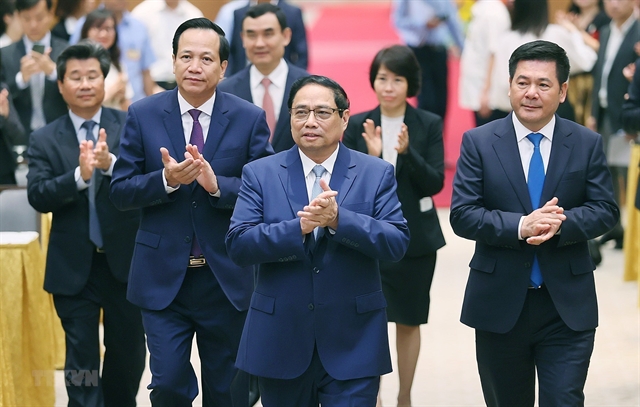 Economy
Economy


|
| Prime Minister Phạm Minh Chính attends a FDI investment conference in Hà Nội. VNA/VNS Photo |
HÀ NỘI Foreign investment and investors have been and will continue to play a crucial role in Việt Nam's socio-economic development, heard participants at a conference held yesterday in Hà Nội.
The conference was held to discuss ways to encourage growth, implement fair treatment, stimulate innovation, and enhance the efficiency of investment cooperation.
In the first nine months of 2023, the Southeast Asian economy's macroeconomic situation remained stable, while inflation was under control. GDP growth for the first three quarters of the year reached 4.24 per cent; the currency market was stable, exchange rates were managed, and interest rates decreased significantly, ensuring both the inflation target and credit requirements of the economy could be met.
The trade surplus was US$21.6 billion, foreign direct investment (FDI) registered at US$20.2 billion, an increase of 7.7 per cent, with new projects increasing by 66.3 per cent and capital increased by 21.5 per cent. By September this year, 144 countries/territories had invested in the country with over 38.3 thousand projects, totalling over US$455 billion in capital. Việt Nam has become the third-largest economy in ASEAN with a GDP scale of over US$400 billion.
During a speech given at the event, Prime Minister Phạm Minh Chính said the Vietnamese government remains committed to supporting FDI businesses and is willing to adopt a flexible approach to management with the objective of providing timely solutions to address investors' concerns.
The country has been actively working together with foreign investors in identifying and solving challenges and difficulties, including the limited scale of the economy, internal capacity, and poor competitiveness.
On the other hand, such challenges and difficulties were also opportunities to promote innovative thinking, creativity, and future vision, which allowed the government and investors to work together, share knowledge, and coordinate efforts, according to the Ministry of Planning and Investment (MPI).
According to the ministry, recent attempts to address legal barriers and obstacles have resulted in the successful establishment of large-scale FDI projects in Hải Phòng, Bình Dương, Nghệ An, and Bắc Ninh.
Support for businesses in finding new markets, boosting exports, and promoting domestic consumption, in tandem with the implementation of the Vietnamese government's socio-economic recovery and development programmes, have provided many incentives for private investment and economic growth.
In addition, administrative reforms have significantly improved the speed at which investors and projects can move, creating new drivers for the economy. The government has been employing a proactive approach in attracting additional FDI to the country with improved infrastructure, energy supply, skilled labour pool, and domestic industries.
Investors are more than welcome to supply inputs and consult with the government regarding investment policies and laws, according to the MPI.
The ministry reminded investors that Việt Nam's focus in finding FDI in the coming decades will be on projects that employ advanced technologies and modern management techniques that are environmentally friendly with high added value. MPI advised businesses to put forward proposals and projects aligned with such a vision of sustainable development and mutual prosperity.
According to the ministry, promoting and building connections among SMEs and large multinational corporations is key to Việt Nam's greater integration into the global supply and value chains.
In addition, stronger collaboration among entrepreneurs, businesses, scientists, and research and development institutes plays a vital role in allowing business access to technological advancements, increased productivity, and sustainable growth.
David John Whitehead, a board member from the Vietnam Business Forum (VBF), said the business community, including foreign investors and businesses, appreciates the government's efforts in stabilising the macroeconomic conditions and in controlling inflation in recent years.
John Rockhold, chairman of the American Chamber of Commerce in Vietnam (AmCham), said the recently upgraded comprehensive strategic partnership between Việt Nam and the US has opened up many opportunities for bilateral cooperation and that there is a growing interest in Việt Nam among US corporations as a potential investment destination, especially in the semiconductor industry.
Tadahiro Kinoshita, chairman of the Japan Chamber of Commerce and Industry in Vietnam (JCCI), said while Japanese businesses in the country are making efforts to boost the development of supporting industries, local suppliers have not been able to contribute significantly.
He raised a concern that domestic industries could only provide a mere 16 per cent of goods and raw materials required by FDI businesses and advised the government to take measures to quickly address the low localisation rate and encourage SMEs to participate in the FDI supply chain.
Torben Minko, vice chairman of the European Chamber of Commerce in Vietnam (EuroCham), said that sustainable development is among the chamber's top priorities, with Việt Nam being a cooperation model for countries dealing with the adverse effects of climate change. Minko said the EU is willing to support Việt Nam in its transition to green development, especially in the energy field. VNS




